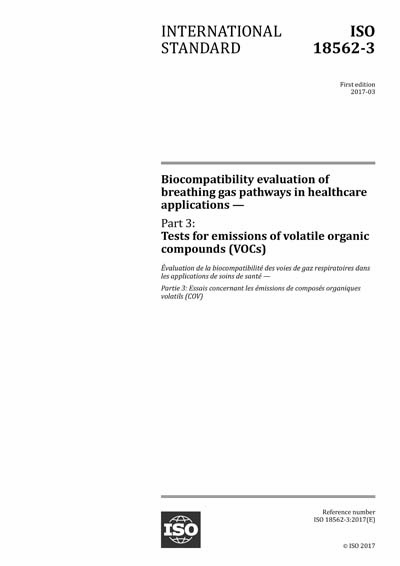Historical
ISO 18562-3:2017
Biocompatibility evaluation of breathing gas pathways in healthcare applications - Part 3: Tests for emissions of volatile organic compounds (VOCs)
ISO 18562-3:2017 specifies tests for the emissions of volatile organic compounds (vocs) from the gas pathways of a medical device, its parts or accessories, which are intended to provide respiratory care or supply substances via the respiratory tract to a patient in all environments. The tests of this document are intended to quantify emissions of vocs that are added to the respirable gas stream by the materials of the gas pathway. This document establishes acceptance criteria for these tests.
ISO 18562-3:2017 addresses potential contamination of the gas stream arising from the gas pathways, which is then conducted to the patient.
ISO 18562-3:2017 applies over the expected service life of the medical device in normal use and takes into account the effects of any intended processing or reprocessing.
ISO 18562-3:2017 does not address biological evaluation of the surfaces of gas pathways that are in direct contact with the patient. The requirements for direct contact surfaces are found in the ISO 10993 series[1].
Medical devices, parts or accessories containing gas pathways that are addressed by this document include, but are not limited to, ventilators, anaesthesia workstations (including gas mixers), breathing systems, oxygen conserving devices, oxygen concentrators, nebulizers, low-pressure hose assemblies, humidifiers, heat and moisture exchangers, respiratory gas monitors, respiration monitors, masks, mouth pieces, resuscitators, breathing tubes, breathing systems filters, Y-pieces and any breathing accessories intended to be used with such devices. The enclosed chamber of an incubator, including the mattress, and the inner surface of an oxygen hood are considered to be gas pathways and are also addressed by this document.
ISO 18562-3:2017 does not address contamination already present in the gas supplied from the gas sources while medical devices are in normal use.
EXAMPLE Contamination arriving at the medical device from gas sources such as medical gas pipeline systems (including the non-return valves in the pipeline outlets), outlets of pressure regulators connected or integral to a medical gas cylinder or room air taken into the medical device is not addressed by ISO 18562 series.
ISO 18562-3:2017 is intended to be read in conjunction with ISO 18562‑1.
NOTE This document has been prepared to address the relevant essential principles of safety and performance as indicated in Annex B.
International Organization for Standardization [iso]

